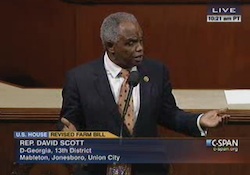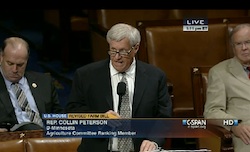Agricultural groups are discouraged with the passage today of the U.S. House of Representatives’ H.R. 1947, the Federal Agriculture Reform and Risk Management Act of 2013 (FARRM). The bill slid through with a tight margin of 216 to 208 after more than six hours of debate today and did not include food stamp authorization or nutrition programs, which the House says it will address as separate issues.
 However, during the debates, several legislators noted that the point of the farm bill is to feed Americans and this bill in fact does not achieve this goal. “What we have here is not a farm bill,” said Rep. David Scott, (D-GA). “You tell me how in the world we can have a farm bill and separate food and nutrition out from it. The American people don’t get that. When you think of farms and you think of agriculture, you mean to tell me it ain’t about food?”
However, during the debates, several legislators noted that the point of the farm bill is to feed Americans and this bill in fact does not achieve this goal. “What we have here is not a farm bill,” said Rep. David Scott, (D-GA). “You tell me how in the world we can have a farm bill and separate food and nutrition out from it. The American people don’t get that. When you think of farms and you think of agriculture, you mean to tell me it ain’t about food?”
Bob Stallman, the president of the American Farm Bureau Federation reacted with the statement that the organization looks forward to moving ahead with fundamental farm policy legislation. “While we don’t yet know what the next steps will be, we will be working with both sides of the aisle and both chambers of Congress to ensure passage of a new five-year farm bill.”
Stallman added, “While we were hopeful the farm bill would not be split, nor permanent law repealed, we will now focus our efforts on working with lawmakers to deliver a farm bill to the president’s desk for his signature by September.”
Chairman Collin Peterson (D-MN) stood in opposition to the bill – one that he began debates on in 2010. He noted that one reason was the move to split the nutrition and food stamps program from the bill. “It jeopardizes changes of the bill ever becoming law, and I think repealing permanent law all but ensures we’ll never write a farm bill again in this House.”
Collin is not alone in his opposition and pointed out that last week, 532 diverse organizations came out in opposition to the split.
One of those groups was the National Farmers Union (NFU). “Today’s strictly partisan vote to pass the farm bill apart from the nutrition title undermines the long-time coalition of support for a unified, comprehensive farm bill which has historically been written on a bipartisan basis,” said NFU President Roger Johnson.
“NFU will continue to do all it can to get a reasonable bill through the conference process. Any final legislation must continue existing permanent law provisions and include meaningful safety net protections for both family farmers facing difficult times and the food insecure,” Stallman added.
As Rep. Scott noted, the farm bill affects every American and National Corn Growers Association (NCGA) President Pam Johnson agrees.  “We view the proposed actions to be taken on the floor of the House today with disappointment. Legislation that for decades has been a bright spot for how our Congress should work – in a bipartisan, bicameral manner – is now stuck in a morass of petty bickering and political gamesmanship. We do not believe that the link between farm programs and nutrition programs should be severed. We see benefits beyond the political in keeping the ties between those who produce food and those who need it.”
“We view the proposed actions to be taken on the floor of the House today with disappointment. Legislation that for decades has been a bright spot for how our Congress should work – in a bipartisan, bicameral manner – is now stuck in a morass of petty bickering and political gamesmanship. We do not believe that the link between farm programs and nutrition programs should be severed. We see benefits beyond the political in keeping the ties between those who produce food and those who need it.”
“Moreover,” continued Johnson, “We have serious disagreement with Title I of the legislation the House will consider today. We should not miss the opportunity to work towards meaningful reform of agricultural policy that is more market oriented and less costly to the American taxpayer. Additionally we oppose the move to repeal the 1949 permanent farm bill law. The actions surrounding the deliberation of this farm bill prove that the Congress must have some mechanism to force action.”
The next step is for the House-Senate conference committee to meet and proposed a compromised version of each sides’ bill.
